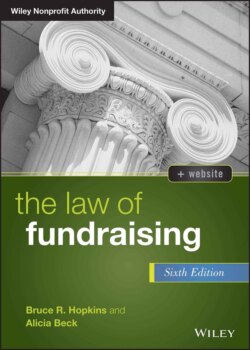Читать книгу The Law of Fundraising - Bruce R. Hopkins - Страница 51
(e) Contribution
ОглавлениеA contribution basically is a transfer of money or property in the absence of consideration—it is to be contrasted with a sale.20 The term may be defined in a charitable solicitation act as a gift, contribution, bequest, devise, or other grant of any money, credit, financial assistance, or property of any kind or value. The statutory definition may embrace promises to contribute (pledges).
The law on this point is the most developed in, not surprisingly, the federal income tax charitable giving setting. Years ago, the U.S. Supreme Court observed that a contribution is a transfer motivated by “detached or disinterested generosity.”21 Another observation from the Court was that a “payment of money [or transfer of other property] generally cannot constitute a charitable contribution if the contributor expects a substantial benefit in return.”22 Earlier, the Court referred to a contribution as a transfer made “out of affection, respect, admiration, charity or like impulses.”23
The Court has adopted use of the reference to consideration in determining what is a contribution. Thus, it wrote: “The sine qua non of a charitable contribution is a transfer of money or property without adequate consideration. The taxpayer, therefore, must at a minimum demonstrate that he [or she] purposefully contributed money or property in excess of the value of any benefit he [or she] received in return.”24 Essentially the same rule was subsequently articulated by the Court, when it ruled that an exchange having an “inherently reciprocal nature” is not a contribution and thus cannot be a charitable contribution where the recipient is a charitable organization.25
Dues, being payments for services, are not contributions. The term dues embraces payments by members of an organization in the form of membership dues, fees, assessments, or fines, as well as fees for services rendered to individual members.
A loan is not a contribution, including a loan to a charitable organization. If a person makes a loan to a charity, with the intent to subsequently forgive it, and the amount of the loan, or a portion of it, is subsequently forgiven, the amount forgiven becomes a contribution as of the date of forgiveness. As noted, a single transaction can embrace both the elements of a contribution and a sale.26
Essentially, the concept in this context is that a contribution is a payment to a charitable organization where the donor receives nothing of material value in return.27 Thus, a court ruled that a state's charitable solicitation act did not apply to the solicitation of corporate sponsors for a marathon, stating that the transaction was a “commercial” one, “[i]t is not a gift,” “[i]t is a corporate opportunity,” and “[i]t has nothing to do with philanthropy.”28
The amount or value of a charitable contribution may be pertinent in the application of a state's charitable solicitation act. Certain small solicitations are often exempted from these acts. These determinations are made on the basis of the monetary value of the gifts in the aggregate.29 In most instances, these calculations are made on the basis of (i.e., are confined to) the payments, or portions of payments, that are in fact contributions.
